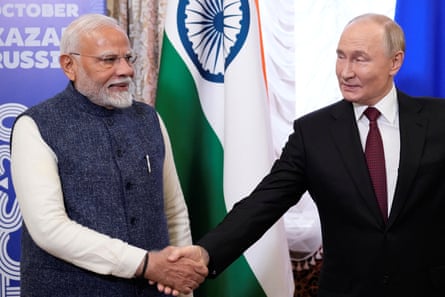The relationship between India and the US is facing one of its most significant challenges in decades, as the Trump administration doubles down on its demands that India stop buying Russian oil or face punitive tariffs.
The US president, Donald Trump, has refused to cut tariffs on Indian exports to the US, as he has for other countries, and on Monday said he would significantly raise them over its purchases of cheap Russian oil, which now account for one-third of its imported oil.
“They don’t care how many people in Ukraine are being killed by the Russian War Machine,” he said in a post to his Truth Social network, also accusing India of selling Russian oil “on the Open Market for big profits”. In a previous social media tirade last week, he said of Russia and India: “They can take their dead economies down together.”
Appearing on Fox News on Sunday at the weekend, his hardline deputy chief of staff, Stephen Miller, did not hold back as he took direct aim at India, stating that Trump had made it clear “it is not acceptable for India to continue financing this [Ukraine] war by purchasing the oil from Russia”.
The whiplash the last few days have caused in the corridors of New Delhi is palpable. It was only February when India’s prime minister, Narendra Modi, was one of the first world leaders to be hosted by Trump and the two men embraced each other and hailed their “great friendship”. Indian officials were adamant that Russia had not even come up in trade negotiations until Trump’s public outburst.
India had come to view the US as one of its strongest and most reliable partners, united by the bonhomie between its leaders and growing cooperation on everything from regional security and defence to bilateral trade, intelligence, technology and an increasingly powerful Indian diaspora in the US.
A united geopolitical ambition to counterbalance the power of China had only brought them further together under recent presidents.
Yet it did not go unnoticed by India that China – the other big buyer of sanctioned Russian oil, which also has leverage over the US in the form of rare earths – has not received similar threats, and neither has Turkey.
Trump’s moves have been met with a frosty, if not outright defiant, reception among Indian officials. After Trump told reporters he had heard India would “no longer” be buying Russian oil, he was swiftly contradicted by Indian officials over the weekend, who said there would be no change in policy.
Under India’s “non-alignment” foreign policy it has maintained a close partnership with Russia over decades while strengthening ties with the US; a position largely tolerated by Washington and reiterated by Randhir Jaiswal, the spokesperson for India’s foreign ministry, following Trump’s threats.
“Our bilateral relationships with various countries stand on their own merit and should not be seen from the prism of a third country,” said Jaiswal. “India and Russia have a steady and time-tested partnership.”
In a column in the Indian Express, Shyam Saran, a former Indian foreign secretary, did not mince his words. “Donald Trump was supposed to be good for India in his second presidency,” he said. “He has turned out to be a nightmare.”
Saran was among those who called for India to follow the example of China and Brazil and stand up to Trump. He insisted that although there would be “pain in resisting Trump … we should be prepared to endure it”.
“Submitting to his exaggerated demands, which are now political as well as economic, would severely undermine India’s national interests,” said Saran. “We cannot give any country a veto over which countries India should or should not partner with.”
It is widely agreed among analysts that Modi has been put in an unenviable position by Trump; either acquiesce to Trump’s demands and see loss of face domestically or reject them and face sky-high tariffs – and possibly other punitive actions – that would cripple the Indian economy.
The Indian political scientist Pratap Bhanu Mehta said India was not the exception in mistakenly thinking that “Trump is purely transactional and that by placating him, pandering to his ego and giving him good headlines, it will be enough to make him quietly dial back”.
One of the major sticking points for Modi, he said, was the highly public nature of Trump’s threats, which had complicated the possibility of backdoor negotiations over India quietly moving away from buying Russian oil and arms.
He said Trump had already “frankly humiliated the Indian prime minister” over the recent India-Pakistan conflict in May, where Trump had publicly taken the credit for negotiating a ceasefire – a position vehemently denied by the Modi government in the aftermath.
Trump’s recent embrace of Pakistan, signing deals with India’s enemy on cryptocurrency, mining and oil – and even having the chagrin to suggest India may one day buy Pakistani oil – as well as hosting the Pakistan army chief for lunch in the White House, had only added insult to injury.
Mehta said suspicions towards the US in New Delhi now resembled those of 1971, when President Richard Nixon and his national security adviser, Henry Kissinger, sent warships to India in what is considered one of the lowest points of the US-India relationship. “The damage is already done,” said Mehta. “No matter what deal they come to now, distrust of the US is only going to continue to skyrocket.”









